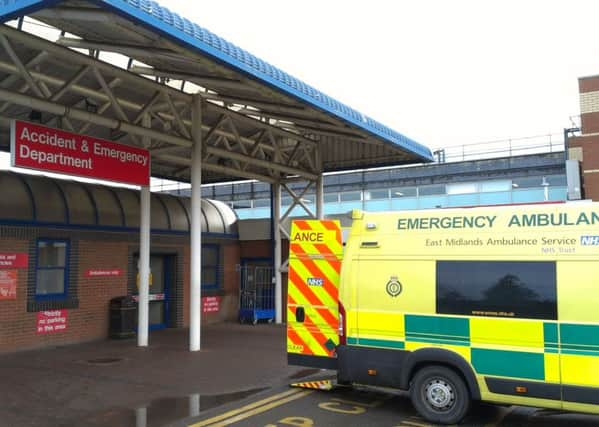Urgent appeal for people to stay away as Kettering hospital experiences busiest winter ever


Attendance at the accident and emergency (A&E) department has involved 1,021 patients over the past four days, which is 255 patients per day.
This compares to 784 patients (196 a day) over the same week last year and is a 30.2 per cent increase.
Advertisement
Hide AdAdvertisement
Hide AdA current issue is the large numbers of walk-in patients with minor illnesses, long term conditions and minor injuries.
Kettering General Hospital’s medical director, Dr Andrew Chilton, said: “The message to patients with conditions that don’t need to be seen at hospital very urgently is please do not come here.
“We are urging people to make maximum use of their GPs, out-of-hours GP service, Corby Urgent Care Centre and local pharmacists as their priority.
“We are dealing with many genuinely ill patients – who do need hospital care – and we need to concentrate our time and resources on caring for them.
Advertisement
Hide AdAdvertisement
Hide Ad“If you do come to A&E with a minor condition you will be waiting a number of hours – so please do everything you can to find an alternative at this especially busy time.”
To help deal with the situation the trust is cancelling and rearranging non-urgent operations and outpatient appointments from today to enable the trust’s doctor and nursing teams to concentrate on caring for the influx of patients.
Dr Chilton said: “We apologise to patients who are affected by this and will rearrange appointments for them as soon as possible.”
The surge in pressure this week comes after an extended period of time where the hospital has been seeing 20 per cent more patients than usual.
Advertisement
Hide AdAdvertisement
Hide AdThis had already put significant pressure on hospital beds and discharges before this week’s even larger surge.
This winter is the busiest in the hospital’s history so far.
Examples of appropriate use of A&E:
- Serious medical problems such as chest pain, collapse, or heavy blood loss
- Severe limb injuries which are very painful and could be caused by a broken bone
- Burns which are large, or deep, and need dressings
Advertisement
Hide AdAdvertisement
Hide Ad- Deep cuts which won’t stop bleeding/may have damaged tendons or may need stitches to heal properly
Examples of inappropriate uses of A&E:
- Coughs and colds - most people would be best just to stay at home or see their local pharmacist
- Old injuries or joint problems - are best seen by your GP, at least initially
- Queries about medication - these are best dealt with by your GP
Advertisement
Hide AdAdvertisement
Hide Ad- Toothache - you need to be seen by a dentist. Hospitals like Kettering General do not have trained dentists in A&E
- Trying to use A&E to get a ‘second opinion’ rather than using the GP service
- Chronic conditions which could be managed by your GP – for example headaches
While the hospital tries to deal with the pressure, it is encouraging people who have more minor problems to use Corby’s Urgent Care Centre.
Advertisement
Hide AdAdvertisement
Hide AdThe Corby Urgent Care Centre is located at the Willowbrook Health Complex, in Cottingham Road, Corby, and has free car parking.
No appointments are necessary, anyone can use the service, and the centre is open 8am to 8pm every day of the year.
It is a service for an injury or illness that needs urgent attention and reduces the need for people to travel to the hospital’s A&E department.
It has a range of diagnostic facilities including an x-ray department with extended opening hours and short-term observation bays - again so patients do not need to travel to a hospital for these services.
Advertisement
Hide AdAdvertisement
Hide AdThe centre aims to initially assess more than 95 per cent of its patients in less than 15 minutes and patients are seen by a doctor or senior clinical nurse practitioner after being initially assessed by a nurse to establish how urgent their complaint is.
As with all emergency departments patients are seen in a priority manner.
The more urgent the condition is, the faster you are seen.